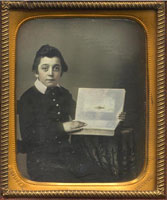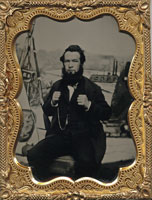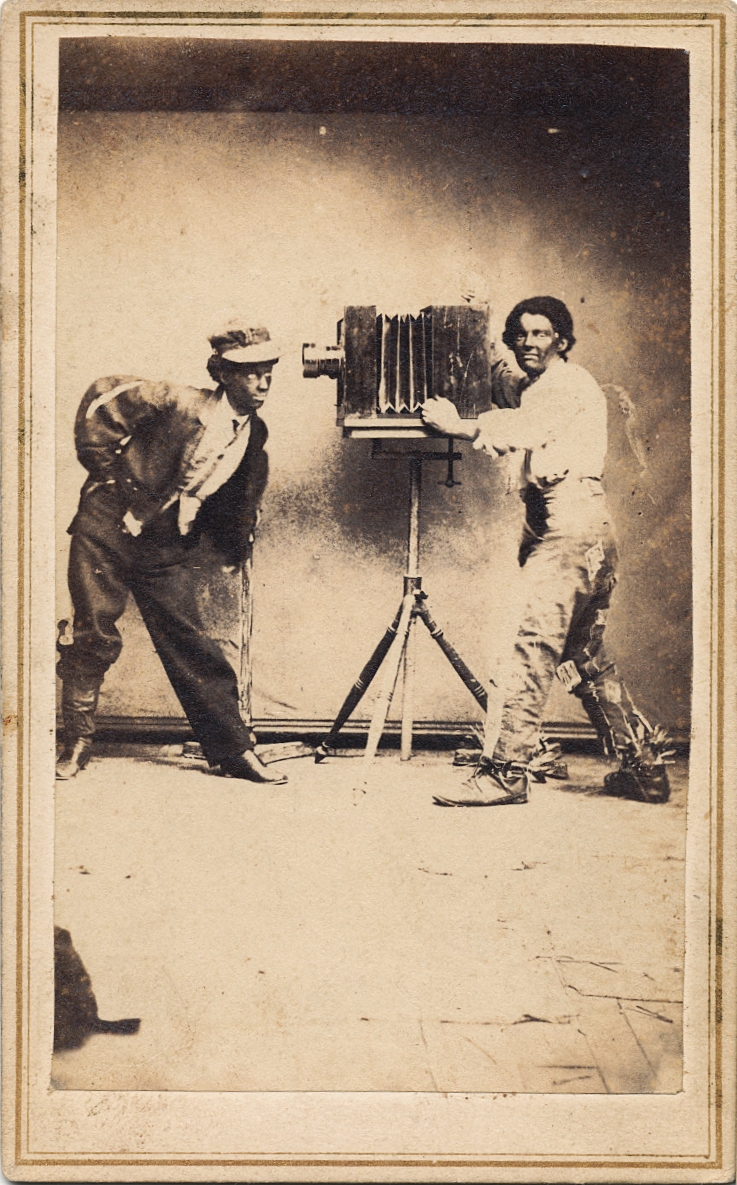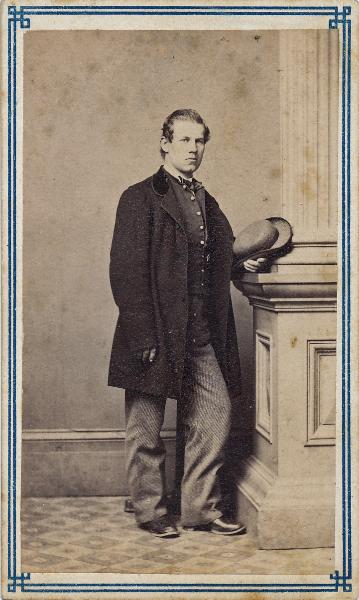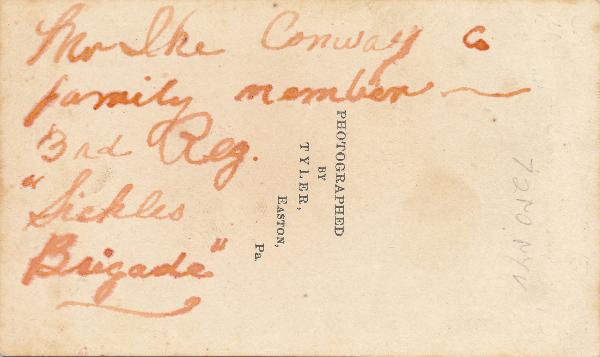Issac Conway 72nd NY WIA Gettysburg
Item #: 14091
Click on an image to enlarge
Issac Conway 72nd NY WIA Gettysburg Conway was WIA at the peach orchard at Gettysburg. The post war ink on the back reads, "Mr. Ike Conway a family member, 3rd Reg Sickles Brigade” Back marked Tyler, Eason, PA.
Isaac Conway
Residence was not listed; 39 years old.
Enlisted on 8/19/1862 at New York City, NY as a Private.
On 8/19/1862 he mustered into "C" Co. NY 72nd Infantry He was transferred out on 7/23/1864
On 6/23/1864 he transferred into "K" Co. NY 120th Infantry; (date and method of discharge not given)
He was listed as:
* Wounded 7/2/1863 Gettysburg, PA
NEW YORK SEVENTY-SECOND INFANTRY
(Three Years)
Seventy-second Infantry.-Cols., Nelson Taylor, William O.
Stevens, John S. Austin; Lieut.-Cols., Israel Moses, John S.
Austin, John Leonard; Majs., William O. Stevens, John Leonard, Casper K. Abell.
The 72nd, the 3d regiment of the Excelsior brigade, was composed mainly of members from New York city and Chautanqua county and was mustered into the U. S. service at Camp Scott, Staten island,from June to Oct., 1861, for three years. It left there on July 24, 1861, for Washington, where it was joined by two of its companies late in October.
It suffered its first severe loss at Williamsburg where the
Excelsior brigade bore the heaviest burden of the battle, the
loss of the 72nd being 195 killed, wounded or missing, 77 of whom were killed or mortally wounded. At Fair Oaks and in the Seven Days' battles the regiment was active and was then withdrawn from the Peninsula to join in the campaign under Gen. Pope in Virginia, during which it lost 37 men.
It was withdrawn with the brigade to the vicinity of Washington for much needed rest and reinforcement, and remained there through the Maryland campaign, leaving for Falmouth in November. It participated in the battle of Fredericksburg; went into winter quarters at Falmouth; broke camp late in April, 1863, for the Chancellorsville movement; took a prominent part in that battle, Col. Stevens and 4 other officers being killed, the total loss of
the regiment being 101.
At Gettysburg the regiment, which had by this time become noted for its fighting qualities, occupied an advanced position on the Emmitsburg road, which was valiantly defended by the brigade, although finally forced to yield it. The loss of the 72nd here was 114, and the ranks, which later fought at Kelly's ford, Bristoe Station and in the Mine Run campaign, were sadly thinned.
The winter camp was established at Brandy Station and in April 1864, the regiment was assigned to the 2nd brigade, 4th division, 2nd corps, with which it served in the Wilderness campaign until May 13, when it was transferred to the 4th brigade, 3d division.
It was active in the campaign until June 19, when seven
Hdqrs. Third Regt., Excelsior Brigade, Camp near Beverly Ford, Va., August 15, 1863. Maj.: In compliance with circular from brigade headquarters, I have the honor to submit the following report of the part taken by this regiment during the recent movements from June 28 to July 26:
after I left. He and the rest of the officers were indefatigable in their exertions to rally the men, who were still hard pressed and obliged to fall slowly back to the crest of the hill from which the brigade started in the morning, where they rallied, and, charging across the field, retook their guns and one battle-flag belonging to the Eighth Florida Regt., together with a large number of prisoners, all of which they brought from the field. It was now dark, and the remnants of the regiment were collected together, and bivouacked for the night in an orchard near the Gettysburg
On the 7th, the regiment marched to Mechanicstown, and encamped for the night. Left camp on the morning of the 8th, at 6 a. m., and marched about 1 mile beyond Frederick, where it bivouacked for the night at 10 p. m. On the 9th, it marched to Middletown, where it received rations for the first time in two days, and encamped for the night on the
battle-field of South Mountain. Moved at 9 o'clock on the morning of the 10th, crossed the Antietam Creek, and halted on the old battle-field of Antietam. Moved again at 10 p. m., recrossed Antietam Creek, and marched until 2
On the 25th, marched through Salem, and bivouacked for the night 5 miles beyond. The next day marched to Warrenton, encamping about 2 miles from the town, on the road to Sulphur Springs.
I have attempted in the foregoing brief and barren sketch to do justice to the brave officers and men who form the Third Excelsior, although I know I have but partially succeeded, and I cannot close without extending my heartfelt sympathy to the friends of those who have been called upon to mourn the loss of kind friends and brave soldiers.
JOHN S. AUSTIN,
Col., Comdg. Third Excelsior.
Maj. J. P. Finkelmeier,
Assistant Adjutant-Gen., Excelsior (Second) Brigade.
Source: Official Records: Series I. Vol. 27. Part I. Reports. Serial No. 43
Isaac Conway
Residence was not listed; 39 years old.
Enlisted on 8/19/1862 at New York City, NY as a Private.
On 8/19/1862 he mustered into "C" Co. NY 72nd Infantry He was transferred out on 7/23/1864
On 6/23/1864 he transferred into "K" Co. NY 120th Infantry; (date and method of discharge not given)
He was listed as:
* Wounded 7/2/1863 Gettysburg, PA
NEW YORK SEVENTY-SECOND INFANTRY
(Three Years)
Seventy-second Infantry.-Cols., Nelson Taylor, William O.
Stevens, John S. Austin; Lieut.-Cols., Israel Moses, John S.
Austin, John Leonard; Majs., William O. Stevens, John Leonard, Casper K. Abell.
The 72nd, the 3d regiment of the Excelsior brigade, was composed mainly of members from New York city and Chautanqua county and was mustered into the U. S. service at Camp Scott, Staten island,from June to Oct., 1861, for three years. It left there on July 24, 1861, for Washington, where it was joined by two of its companies late in October.
After serving for a few months in the vicinity of Washington the regiment was assigned to Sickles' Excelsior brigade, Hooker's division, served along the Potomac in Maryland, near StaffordCourt House, Va., and proceeded to the Peninsula in April, 1862, with the 2nd brigade, 2nd division, 3d corps.
It suffered its first severe loss at Williamsburg where the
Excelsior brigade bore the heaviest burden of the battle, the
loss of the 72nd being 195 killed, wounded or missing, 77 of whom were killed or mortally wounded. At Fair Oaks and in the Seven Days' battles the regiment was active and was then withdrawn from the Peninsula to join in the campaign under Gen. Pope in Virginia, during which it lost 37 men.
It was withdrawn with the brigade to the vicinity of Washington for much needed rest and reinforcement, and remained there through the Maryland campaign, leaving for Falmouth in November. It participated in the battle of Fredericksburg; went into winter quarters at Falmouth; broke camp late in April, 1863, for the Chancellorsville movement; took a prominent part in that battle, Col. Stevens and 4 other officers being killed, the total loss of
the regiment being 101.
At Gettysburg the regiment, which had by this time become noted for its fighting qualities, occupied an advanced position on the Emmitsburg road, which was valiantly defended by the brigade, although finally forced to yield it. The loss of the 72nd here was 114, and the ranks, which later fought at Kelly's ford, Bristoe Station and in the Mine Run campaign, were sadly thinned.
The winter camp was established at Brandy Station and in April 1864, the regiment was assigned to the 2nd brigade, 4th division, 2nd corps, with which it served in the Wilderness campaign until May 13, when it was transferred to the 4th brigade, 3d division.
It was active in the campaign until June 19, when seven
companies were mustered out before Petersburg. The remaining three companies were mustered out July 2 and 20 and Oct. 31, 1864, the veterans and recruits being transferred to the 120th N.Y. infantry. During its term of service the regiment lost 184 by death from wounds and 96 by death from other causes. It is ranked by Col. Fox as one of the "three hundred fighting regiments."
Source: The Union Army, Vol. 2, p. 103
Gettysburg after battle report: Report of Col. John S. Austin, Seventy-second New York Infantry.
Hdqrs. Third Regt., Excelsior Brigade, Camp near Beverly Ford, Va., August 15, 1863. Maj.: In compliance with circular from brigade headquarters, I have the honor to submit the following report of the part taken by this regiment during the recent movements from June 28 to July 26:
We left Middletown June 28, passing through Frederick to Walkersville, where we encamped for the night. On the 29th, we marched through Woodsborough and Middleburg
to Taneytown. Left Taneytown on the morning of the 30th; marched through Bridgeport, and bivouacked for the night about 3 miles from the town. July 1, we marched to Emmitsburg, and encamped about 2 p. m. Broke camp at 4 p. m., and marched to Gettysburg, arriving thereat 2 a. m.
We were ordered to the front about 10 a. m. of the 2d, when our regiment was placed in reserve of the Second Brigade, Second Division. At 2 p. m. we were ordered to advance across an open field in line of battle, the left of our regiment, which formed the extreme left of the brigade, resting on a cross-road, the line running parallel with the main road and in rear of the peach orchard. We remained in line of battle about two hours, under a most terrific fire of shot and shell, when we were pressed so hard on the left flank that we were obliged to fall back. This we did in as good order as the circumstances would permit. At this time I was wounded in the arm and side, and a few minutes after had my horse killed. I was now obliged to give up the command to Lieut.-Col. Leonard, who fought the regiment
after I left. He and the rest of the officers were indefatigable in their exertions to rally the men, who were still hard pressed and obliged to fall slowly back to the crest of the hill from which the brigade started in the morning, where they rallied, and, charging across the field, retook their guns and one battle-flag belonging to the Eighth Florida Regt., together with a large number of prisoners, all of which they brought from the field. It was now dark, and the remnants of the regiment were collected together, and bivouacked for the night in an orchard near the Gettysburg
road.
The next morning the regiment was marched back to the rear, for the purpose of obtaining ammunition and rations for the men. At 2 p. m. they were again moved to the front, to support a battery, where the regiment remained until 7 p. m., when it returned to the position that they occupied in the morning. On the morning of the 5th, they were again moved forward, and took up a position in the second line of battle. In about two hours the regiment was marched back into a field and encamped. On the morning of the 6th, it was found that the enemy had retreated, and we were at once ordered to march. We did not move over half a mile, and then returned to the same camp. It would be doing an act of injustice to the brave men of the Third if I did not speak more at length in regard to their conduct on that memorable and ever-to-be-remembered July 2. It would also seem like an injustice to speak of one as having done better or performed his duty more nobly than another; still, I cannot pass by in silence the manner in which Lieut.-Col. Leonard and Maj. Abell performed their duties upon that occasion; also Capt. Bailey and Lieut. William McConnell. Among the men it is hard to particularize, but I think that our color corporal, Edwin H. Tarry, deserves particular mention. He was ever to the front, and carried the flag through that storm of shot and shell with credit to the regiment and honor to himself. Our loss was very severe. We took 22 officers and 283 men into the fight, and had 8 officers wounded, 1 of whom has since died, 7 men killed, 86 wounded, and 15 missing.*
battle-field of South Mountain. Moved at 9 o'clock on the morning of the 10th, crossed the Antietam Creek, and halted on the old battle-field of Antietam. Moved again at 10 p. m., recrossed Antietam Creek, and marched until 2
o'clock in the morning. Broke camp the 11th, at 6 a. m., and marched 2 miles. Remained in the same position until
4 p. m.; then moved across the Antietam Creek, and encamped for the night. On the 12th, moved about 1 mile, and encamped in a piece of woods, and remained until the morning of the 14th; then again moved forward, and occupied the position that the enemy held the day before
near Williamsport. As the enemy had succeeded in crossing the Potomac, retraced line of march of the day before, passed through Sharpsburg, and encamped about 2 miles beyond the town. On the 16th, moved to within about 2 miles of Harper's Ferry, and encamped at the foot of Maryland Heights. The next day crossed the river, and encamped in Virginia. On the 18th, 19th, and 20th, on the march, arriving at Upperville, where they remained for two days. On the 22d, moved to Manassas Gap, and halted for the night at Piedmont Station, and on the morning of the 23d moved up the Gap to where our troops were skirmishing with the enemy.
The enemy had taken up their position across the Gap, and all the efforts of the skirmishers to dislodge them proved unavailing. At this time the Excelsior Brigade, of which my regiment forms a part, was ordered to charge the heights and drive the enemy from their position. With a yell that would have done credit to a band of demons, our boys sprang to their feet and rushed upon the foe. The first and second heights were carried in the face of a severe fire, when the enemy opened from the opposite hill with a four-gun battery, and the men, who were now completely exhausted, were ordered to hold the position, of which they had so gallantly taken possession. The next morning at daylight it was discovered that the enemy had retreated.
Moved forward to Front Royal, and remained about two hours, and then marched back through the Gap, and encamped for the night 6 miles beyond.
It would not be doing justice to the regiment for me to pass by this point without making some mention of the manner in which both officers and men performed their duty on that occasion; neither would it be proper for me to make any invidious distinction among men who have proved themselves soldiers in every sense of the word on many a hard-fought battle-field, for all did their duty nobly. Each
seemed to vie with the other in his attempt to reach the enemy, thus making it a fight not only for victory but for personal honor. Owing to the uneven nature of the ground, our loss was comparatively small. Eight men were wounded, 1 of whom has since died from the effects of the wound.On the 25th, marched through Salem, and bivouacked for the night 5 miles beyond. The next day marched to Warrenton, encamping about 2 miles from the town, on the road to Sulphur Springs.
I have attempted in the foregoing brief and barren sketch to do justice to the brave officers and men who form the Third Excelsior, although I know I have but partially succeeded, and I cannot close without extending my heartfelt sympathy to the friends of those who have been called upon to mourn the loss of kind friends and brave soldiers.
The above is respectfully submitted.
I am, major, very respectfully, your obedient servant,
JOHN S. AUSTIN,
Col., Comdg. Third Excelsior.
Maj. J. P. Finkelmeier,
Assistant Adjutant-Gen., Excelsior (Second) Brigade.
Source: Official Records: Series I. Vol. 27. Part I. Reports. Serial No. 43
Shipping Weight:
0.25 lb
$550.00 USD
We are currently not accepting orders on-line. If you would like to purchase this item please email medhurstmd@aol.com or give a call 913-851-8462
